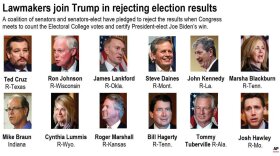"There's a lot of misinformation that's floating out there," Rep. Markwayne Mullin (R-Okla.) said near the beginning of a Monday night telephone town hall, "and we want to discuss some of that."
Mullin, one of a number of Republicans in Washington planning to mount an objection to the Electoral College certification of Democratic President-elect Joe Biden's victory over President Donald Trump at a joint session of the U.S. House and Senate on Wednesday, went on to share misinformation himself, on topics ranging from the election to $2,000 relief checks to COVID-19's impact on Oklahoma's hospitals.
Asked by a constituent whether he believes the November election was "honest," Mullin said he did not.
"I don't. I absolutely don't," Mullin said. All 50 states have certified their election results; Biden won with 306 electoral votes to Trump's 232.
Mullin acknowledged that officials including former U.S. Attorney General William Barr, a Trump appointee, have said there was no evidence of widespread voter fraud.
"But what they go back to is they don't feel like there was enough irregularities that took place that would have changed the outcome of the election," Mullin said. "My question on that, my argument on that one is, if I got caught cheating on a test, the teacher didn't just simply knock, mark that answer that they caught me on wrong for cheating, they threw away the whole test and I got a zero on it."
Republican election officials in Georgia -- one of four states Mullin said he will oppose certification for on Wednesday along with Michigan, Wisconsin and Pennsylvania -- have repeatedly stated that their election was secure and accurate after multiple recounts and legal reviews.
"There's a lot of people out there that are, just, have misinformation, too," Mullin told one caller. "They think that this is something new that we're putting out there, or, I've even been called a sore loser on this."
Mullin did not address President Trump's Saturday phone call to Georgia Secretary of State Brad Raffensperger in which the president pressured officials to "find" enough votes to overturn the state's election results, and Mullin's office did not respond to a request for comment. Nor did the offices of the rest of Oklahoma's Congressional delegation, all Republicans: Reps. Stephanie Bice, Frank Lucas, Tom Cole and Kevin Hern.
Sen. James Lankford (R-Okla.), one of at least a dozen Senate Republicans to announce their intent to object to the Electoral College certification, did not return a request for comment. The office of his counterpart, Sen. Jim Inhofe, said they had no comment.
Asked by a caller why both houses of Congress have been unable to come together to pass a standalone bill for direct $2,000 relief payments to Americans, a policy supported by President Trump, most Democrats and some Republicans, Mullin claimed House Speaker Nancy Pelosi (D-Calif.) was blocking the move.
"She's never going to let a standalone bill like that come to the floor," Mullin said, despite the fact that the Democratic-controlled House passed such a standalone bill with a greater than two-thirds majority last month. Mullin did not vote on the bill, which has not been brought to the floor in the other chamber by Senate Majority Leader Mitch McConnell (R-Ky.). His office did not respond to a request for comment the day of the vote asking how he would have voted.
Mullin also misrepresented, or otherwise erred while discussing, Oklahoma's COVID-19 situation.
"Have we seen a rise in positive tests? Yes. Have we seen an overwhelming run on our hospitals because of hospitalizations? No," Mullin said, despite health care and hospital leaders across the state stressing for weeks that intensive care units in Oklahoma are operating at, near or sometimes over capacity and some hospitals are constructing overflow tents.
"We still have more capacity. We only have roughly 1,500 people hospitalized" with COVID-19, Mullin said. At the time of his remarks on Monday evening, more than 1,900 were hospitalized. The state has not reported a daily COVID-19 hospital census of fewer than 1,500 patients since November.
Mullin said he was disappointed at news coverage of the attempts by the president and his allies to overturn the results of the election.
"I get frustrated at the media quite a bit, I do, because I think they're 100% biased," Mullin said.
"The media does a really good job about trying to judge peoples' motives, and want to accuse members of this and members of that. I think we've all got to take a deep breath and give, sometimes, people the benefit of the doubt," Mullin said.






